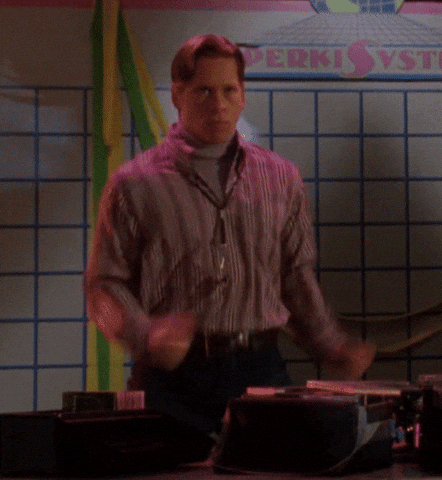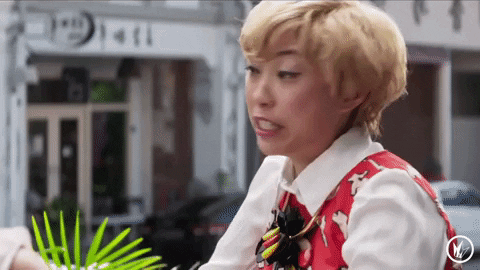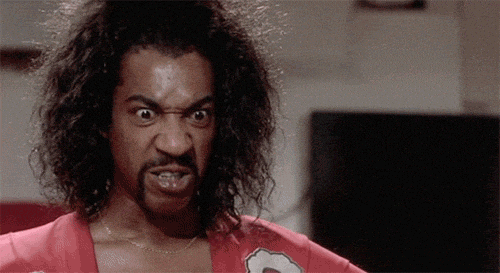Can we talk about cultural appropriation, again? As in from this Busy Black Woman's perspective, what it is and what it isn't? Because Halloween is coming and things are about to get very uncomfortable.
The motivation for revisiting this topic is Nora Lum (better known as Awkwafina), star of the current Marvel Studios superhero offering Shang-Chi. From what I could surmise, while doing the press promos for that film, she was confronted about her use of a 'blaccent' in her debut film, Crazy Rich Asians (2018). And it appears that her response was to look like a deer caught in headlights instead of offering a genuine answer. (She's been asked about this in the past and her response was pretty much the same.)
As this clip made the rounds, I saw a lot of dragging on Black Twitter. That resulted in a familiar discomfort that I've come to recognize initially as old age because blue light filters and sitting in one place for a long time have adverse effects on me physically. But the headache I also got could be attributed to my feeble efforts to comprehend this generation gap between me and the self-appointed Millennial gatekeepers of Blackness on social media.
Before you read any further, I already know that yes, I am getting Auntie old and anyone under the age of 40 might give me an Ok Boomer sigh throughout because I may end up sounding a lot like some of those cranks that complain about political correctness. BUT...
Y'all have this one wrong.
First of all, there is no denying that Blackness gets routinely appropriated and mocked, with oppressors and fellow oppressed people of color guilty of both. We know that stereotypes in artistic renderings of marginalized people of color were once part of mainstream popular culture, which is how we got Aunt Jemima, Chief Wahoo, and six Dr. Seuss books banned. While white folks sort out their feelings about losing some of their beloved racist icons, some of y'all need to take a break from being offended by everything.
I've seen the appropriation accusation thrown at artists like Bruno Mars, then seen the various reactions when we catch white folks reinterpreting art or cultural expressions that we have claimed as ours. Every Christmas, I swear someone posts some choir's bland version of Betelehemu in our SpelHouse group and practically demands reparations. Another clip that makes the salt, but no seasoning rounds annually comes from the Brigham Young Cougarettes. Admit it, we get perverse glee in laughing at white people.And that is because we are keenly aware of the cultural white-washing that has occurred to make certain aspects of Black culture more palatable to white audiences. While that doesn't just happen to us, we take notice and offense to it more readily. It should be an honor to see the Mormon Tabernacle Choir perform a version of a Yoruba Christmas carol or to see the all-white BYU dance team modestly twerking, but there is that pesky matter of historic racism and exclusion in the Church of Latter-Day Saints. While the Mormons would argue that this is progress, we are right to detect both irony and an appalling lack of awareness. And no rhythm.
At the same time, we also know that not all aspects of Black culture are the exclusive creations of Black Americans. As previously mentioned, Betelehemu is a Yoruba Christmas performance piece that was written and arranged by Morehouse College alumni Babatunde Olatunji and Wendell P. Whalum. Of course, that means the Morehouse Glee Club performs the definitive version, but I wonder if there are Nigerians that see it and feel similarly possessive. How many of us insist on proudly embracing its African-ess, coifed in Ghanaian kente stoles and kufis made in China? (Take all the time you need to get that.) And why are we surprised that some of these PWI bands finally got the memo to jazz up their half-time shows? But more significantly, when did we not notice the various ways that other cultures have been the basis of almost everything that has been branded quintessentially American?
At what point do we redraw the lines so that there is no confusion between what is "ours" and what belongs to another marginalized group or culture? How many of these so-called Millennial gatekeepers of Black culture grew up on anime style cartoons or collecting Hello Kitty and Pokemon? What about visual artists like Iona Rozeal Brown, is she appropriating Japanese culture, or is she creating bold statements about cultural overlap and mutual inspiration? How many of us have kimono-style robes or have ever worn our human hair weaves styled into a low chignon with chopsticks? What about those fireworks that we love to shoot off every Independence Day? Are we not acknowledging that we got Tiger Woods in a trade for the Wu-Tang Clan?Do y'all even get why that Dave Chappelle Racial Draft skit was so funny?
And then it occurred to me, no they don't because they didn't grow up in the 70s and 80s like I did. So they don't know anything about 70s film star Jim Kelly or the friendship between Kareem Abdul Jabbar and Bruce Lee. They probably don't get old school Godzilla movies; TV shows like Ultraman (1972-73) or Kung Fu (1972-75); the original version of Kung Fu Fighting (1974) by Carl Douglas; references to the original Karate Kid (1984-89) movie franchise; crushing on Ricky "The Dragon" Steamboat or Dustin Nguyen as Harry Ioki on 21 Jump Street (1987-1991); Michael Jai White as Spawn (1997); or why Kill Bill (2003-04) is such a gratuitously guilty cult classic. I am more than 1000% sure that none of them have ever seen The Last Dragon (1985) with Taimark as Bruce Leroy...
So if we don't relate to the same pop culture references, or get that for many of us who came of age in the 80s, we didn't openly discuss or fixate on the notion of perpetual antagonism between the African American and Asian American communities. I'm not naïve, because there were tensions, but shopkeeper rudeness was not the norm with every Asian American in our personal orbits. For those of us who grew up with Asian American friends in our schools and neighborhoods, we gained some measure of cross-cultural understanding. There was a Filipino community just over the DC line in nearby Oxon Hill, Maryland made up of kids who definitely adopted what we would call Black affectations to be down. We didn't hold that against them, especially since they had to patiently explain the differences among Chinese, Japanese, Vietnamese and other Southeast Asian cultures.
So when I see Awkwafina, and know that she started out as a rapper from Queens, and think back to all the other Asian American friends I've had through the years, I don't get why she's problematic. Any more so than Debbie Harry of Blondie getting credit for being the first rapper on MTV? Have any of you met native New Yorkers from the boroughs and heard them talk? And if you haven't, how many of you speak one way at work and another way at home and thought nothing of it until someone came up with the term code-switching?
But let me take this a step further because the danger implicit in the attacks on Awkwafina and others go beyond whether she donned a blaccent. She's an actor and what she gets paid to do is assume other personas. That also includes accents. Plenty of actors adopt affectations in speech that aren't natural to them. For example, Jasmine Guy used a very exaggerated Southern drawl in her portrayal of Whitley Gilbert on A Different World and to this day, I have yet to hear anyone complain. I know that I have mentioned the fact that many of the actors in Black Panther (2018) were American, and there are countless other examples of British actors portraying American Southerners, Canadians, and Australians with few complaints. Would you argue that Gillian Anderson needs to return that Emmy?
Should Awkwafina have had a better response to the question of using a blaccent when she has explicitly rejected adopting "Asian" affectations in speech for roles? Yes, although I'm guessing the politics of that choice are much more complicated. As I have been telling my age all through this piece, I need to invoke the memory of actor Pat Morita, best remembered by my generation for his role as Mr. Miyagi in the original Karate Kid franchise. Most of us were shocked to learn that he didn't speak with a heavy Asian accent. But it didn't matter because when people saw him, they had a certain expectation of how he should sound. At times, several other Asian American actors with no accents took on roles where they had to adopt affectations to seem more convincing including Lauren Tom (for Bad Santa), Tamalyn Tomita (for Karate Kid 2), and Constance Wu (for Fresh Off the Boat). I get Lum's reluctance to follow suit even if it is less likely that she would face such an expectation now.
Therefore, in a film such as Crazy Rich Asians (CRA) where the actors with British accents appeared to be cast intentionally to represent the born and bred while the others were clearly cast as the nouveau riche or worse, American...
Before I completely lose track of my point, the accusation of cultural appropriation is almost the same as knowing obscenity when I see it. We're clear that we don't want people to treat culture like a costume; yet, isn't that more or less what culture becomes if we don't allow for context? Especially in America where a man wearing Bermuda shorts, a Hawaiian shirt, and black knee socks with sandals while grilling shish kabobs is probably somebody's Dad, not some culture vulture. However, if it is Megyn Jesus-is-white-and-Santa-too Kelly wondering aloud if she's wearing enough blackened cork on her face, then we definitely need to shut that down. I know that your child dressed as a character from a Disney movie isn't cosplaying culture, but that also depends on which character you choose (so no white kids dressed as Killmonger).
The bottom line is intent. When I watched CRA again earlier this month, Awkwafina's Peik Lin Goh is easily the least problematic character. She stands out in an otherwise uninspiring fish-out-of-water Cinderella story replete with horrible people. Having just watched Mulan (1998) again as well, it is worth noting that there are only a handful of other mainstream depictions of Asian families that don't get bogged down in stereotypes, so perhaps we should complain about that. Follow me here because marginalized Asian representation in popular culture isn't a myth. The Disney Channel gave us a complex Asian American family in Andi Mack (2017-19) a few years ago, but it was so short-lived and was probably better suited for the Freeform audience. Now they are rebooting Doogie Howser MD with the former star of Mack, Peyton Elizabeth Lee, in the title role as Doogie Kamealoha, MD. We haven't even mentioned the paucity of roles for South Asian American actors other than Bollywood productions, with notable exceptions for such stars as Mindy Kalig, Kal Penn, Priyanka Chopra, and Aziz Ansari.
I'm not coming for Awkwafina when I doubt Asian Americans came down this hard against Sho'nuff. Or maybe they realized that over-the-top performance was more about creating a stand-out character in a really bad movie. If we are going to police all incursions into other cultures, then we need to be as equally critical of blue-eyed soul artists as we are of Bruno Mars. We should be more wary about embracing fusion cuisine such as Korean tacos and Turkish pizza without proper acknowledgment from Mexicans and Italians. Or put another way, perhaps we shouldn't be so adamant about gaining access to cultural spaces that were once kept from our reach. Does the world need more Black ballerinas and opera singers? Or martial artists...I think we can tolerate one more mediocre actress.





No comments:
Post a Comment